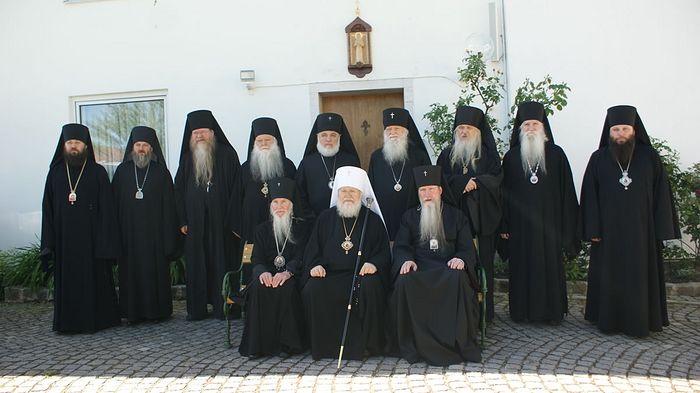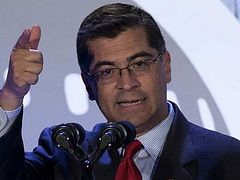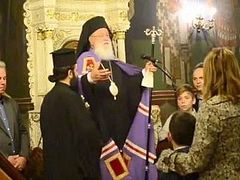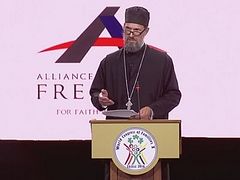New York, July 19, 2017
The Holy Synod of the Russian Orthodox Church Outside of Russia has issued a circular communique in response to the recent scandal concerning the publicly posted and distributed email from Sr. Vassa (Larin) to the Uniate mother of a teenager who recently told his parents he is a homosexual, stating that her advice is in contradiction to the Church, and therefore instructing the faithful to “disregard” the email and its follow-up.
The Holy Synod begins by stating that, having reviewed Sr. Vassa’s original email, dated July 2, and the follow-up, dated July 8, it “is compelled to confirm to its flock and to all Orthodox Christians that the counsel contained therein is in contradiction to the Church’s teaching on sexuality, repentance and family life.” Sr. Vassa herself had declared this, stating, “my personal opinion is not in line with some official pronouncements of my Church.”
While many praised and were quick to defend her counsel, the ROCOR hierarchs write that her advice “does not represent an Orthodox understanding of anthropology or theology, and in the counsel it purports to offer presents a grave spiritual danger to those who might follow it, in terms of their own understanding of sexuality, as well as in the rearing of children.”
Sr. Vassa’s pastoral advice, now condemned, created a stir after her email was distributed to her subscribers and posted publicly on her Facebook page. Among the controversial points of her email was what many saw as an attempt to downplay the sinfulness of homosexuality. “It should be clear to men and women of faith that mere verbal acknowledgement, with regards to homosexuality, that ‘actively living it out is a sin,’ is not sufficient to establish a text’s keeping with Orthodox teaching in the light of the Gospel, when the same text nevertheless equates homosexuality in numerous places to a ‘God-given gift, and cross,’” the Holy Synod writes. ROCOR priest Fr. John Whiteford, who wrote a response to Sr. Vassa’s advice, writes that “after giving quick lip-service to the idea that an active homosexual lifestyle was sinful,” she “proceeded to undermine that belief by minimizing the seriousness of the sin.”
The Synod also writes that Sr. Vassa “[departs] from all Christian teaching,” “falling into the social trap of suggesting that ‘God made me that way,’” condemning her advice that the mother either help her son seek out a parish that will accept homosexual activity, or that he remain in his current parish and thus willingly cut himself off from the communion offered in the Byzantine Catholic Church. Contrary to her advice, the Synod advises that the mother of such a child “should help him, with the Church’s loving care, to repent and seek healing unto redemption of soul and body and the fulness of life.”
Especially offensive to many was Larin’s equating of abstention from communion due to repentance and abstention due to intentional sinfulness in her statement that if the boy abstains from communion because of his sin, then he could inspire his parish as St. Mary of Egypt, who lived so many years in the desert without Holy Communion, inspires Orthodox Christians to this day. In the Holy Synod’s words, Sr. Vassa, “falsely equat[ed] a consequent withdrawal of approach to the Holy Mysteries to the example St. Mary of Egypt, whose long struggle without Holy Communion was not due to her steadfastness in sin but to the extreme conviction of her utter repentance.”
Sr. Vassa deleted her initial email from her Facebook page after a few days, which led many to think she had rethought her position after seeing the controversy that it caused. However, in the follow-up email, also referenced by the Holy Synod, she writes, “No, I didn't delete the post because I'm retracting it in any way. I just thought that, after three full 24-hour days of people fighting about it, it was enough.” She goes on to say that, in fact, she received a popularity boost: “But please note that ca. 90% of the response I got has been positive. I have more followers now, on Facebook, and also more subscribers to my audio-podcasts. So, this isn't some kind of catastrophe or ‘failure,’ for me. OK?”
“In these spiritually confused times … there can be no room for ambiguity or false witness on such critical matters,” the ROCOR encyclical continues, emphasizing that only the Gospel of Christ, proclaimed in the Orthodox Church, can heal, while all deviations from it only contribute to the pain and brokenness of the world.
Sr. Vassa also writes in her second email that, although she can’t necessarily give the best answers, she cannot avoid certain questions, because “I think that for whatever reason, known only to God, I need to speak on certain issues, because I happen to be called to.”
However, in conclusion, the ROCOR Synod writes to the contrary, saying, “We instruct therefore that the contents of these publicly-posted materials be disregarded by the faithful as contrary to the teachings of the Gospel and pastorally harmful; that they be withdrawn and removed from any web sites or publications that seek authentically to represent Orthodox theological and pastoral teaching; and that in the future such materials be treated with most extreme reticence and caution.”
Read the entire statement at the site of the Russian Orthodox Church Outside of Russia.





